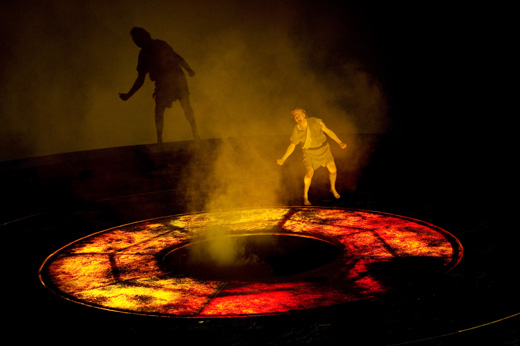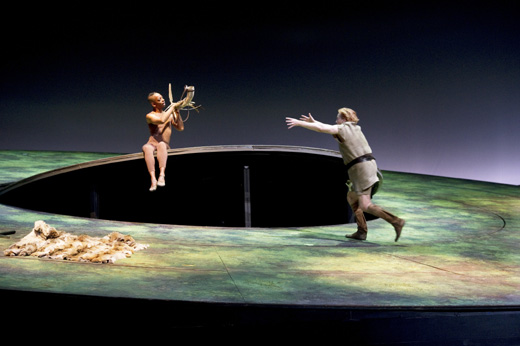 Germany R. Wagner, Siegfried: Soloists, Frankfurter Museumsorchester, Sebastián Weigle (conductor), Frankfurt Opera, 11.11.2011 (JMI)
Germany R. Wagner, Siegfried: Soloists, Frankfurter Museumsorchester, Sebastián Weigle (conductor), Frankfurt Opera, 11.11.2011 (JMI)
Production: Frankfurt Opera
Direction: Vera Nemirova
Sets: Jen Kilian
Costumes: Ingeborg Bernerth
Lighting: Olaf Winter
Damaturg: Malte Krasting
Video: Bibi Ab
Cast
Siegfried: Lance Ryan
Brünnhilde: Susan Bullock
Wanderer: Terje Stensvold
Mime: Peter Marsh
Alberich: Jochen Schmeckenbecher
Erda: Meredith Arwady
Fafner: Magnus Baldvinsson
Forest Bird: Kateryna Kasper

Just six days have passed since the broadcast of Siegfried from the Metropolitan Opera in Robert Lepage’s spectacular production. It’s too short a time to have forgotten it and comparisons are inevitable. Frankfurt is not the Met, granted, but their Siegfried was really good, all the same.
Frankfurt started its new Ring by Vera Nemirova in 2009/10 opera season. It is now on its third installment, and will conclude with Götterdämmerung early next year, followed by two complete cycles in June.
  J.M.Kraus, Symphonies vol.1, P.Boulez / Bayreuth / Jung, McIntyre, Jones, Zednik et al. Dir.Patrice Chéreau DG / Unitel DVD     |
Vera Nemirova has a reputation for provocative productions, with controversy often afoot. This is not the case in this Tetralogy… or at least not in this Siegfried, where she merely narrates the story in timeless rather than mythological fashion. Siegfried is a grown child with all his innocence retained, and Mme Nemirova beautifully shows us his fears of the unknown when he discovers that the sleeping being—woman! mother?—is Brünnhilde. Nemirova also manages to develop Brünnhilde’s personality from warrior goddess to just-awakened vulnerable woman, earnestly in love with Siegfried. Wotan-Wanderer shows all his authority in the first act and his human side in the scenes with Erda and Siegfried. The Forest Bird is—marvelously—played by a dancer while the part is sung from the wings. The sets are not spectacular, there are no dragons or high-tech gadgets, but the production work perfectly well without them.
The three installments of the cycle have a single stage in the form of a large steeply sloped disc formed of concentric circles. This is a rotating stage and between its highest and lowest part there is enough space for the scenes of Mime’s cave, as well as for Erda’s. Nothung is forged on the surface of the big disc as the middle of the stage turns into a huge furnace. In the final scene Brünnhilde lies on her rock that emerges from the center of the circle. Costumes highlight even more the timelessness of the plot, with the Nibelungs in modern outfits, while Siegfried and Brünnhilde seem removed from a comic book on mythology.
Sebastian Weigle is Frankfurt Opera Music Director and he in charge of the whole Ring. Especially act three struck me as one the best performances I have heard from him, and indeed much better than anything that I have heard him in at Barcelona’s Liceu or his Meistersinger in Bayreuth. The orchestra, audibly at their best, seemed like a different one from the previous evening in Les Contes d’Hofmann (review here).
Siegfried is an impossible character to sing; more difficult still than Tristan, since the score is longer and tighter. It’s truly a part for heldentenor, since it needs a true hero to face it. Excellent Siegfrieds have always been scarce, not just now. If that has become more noticeable these days, then that’s because there are so many more performances of Wagner opera than in the past. Ben Heppner has practically disappeared, leaving, in my opinion, two true Siegfrieds today: Stephen Gould and Lance Ryan. Frankfurt had the fortune to discover Lance Ryan some years ago and every year he has remained faithful to the Frankfurt stage—to the delight of their audience. He was an excellent again, with a well-pitched voice, wide enough, very homogeneous through the whole range, easy at the top, with good looks, and remarkable stage skills. Indeed, a great Siegfried.
British soprano Susan Bullock is the Brünnhilde of this Ring. I’ve always found her a great artist and a good singer, albeit with an unattractive voice. Things obviously have not improved and her voice is less pleasant than before, with her high notes above the stave hard to listen to. It is assumed that Brünnhilde sleeps during some 18 years until her nephew Siegfried wakes her up. Time is assumed to stand still while she sleeps her mythological sleep. On this occasion it looked—or rather sounded—that the clock did not stop and the out-of-favor Walküre was clearly Siegfried’s aunt.
Norwegian baritone Terje Stensvold as the Wanderer was a pleasant, enjoyable surprise for. I had heard him last almost 3 years ago as Pizarro at Barcelona’s Liceu. I was not much convinced with his performance then, but this time I found him in fine, ample voice, capable of displaying both authority and humanity.
Peter Marsh was a good Mime—no Gerhard Siegel (Met), but much more than just serviceable. Jochen Schmeckenbecher’s large and well-modulated voice, somewhat light at the top, made for a good Alberich. Meredith Awardy was a remarkable Erda, powerful in the top and bottom registers, with the middle range slightly opaque. Magnus Baldvinsson was a decent Fafner.
José Mª Irurzun
